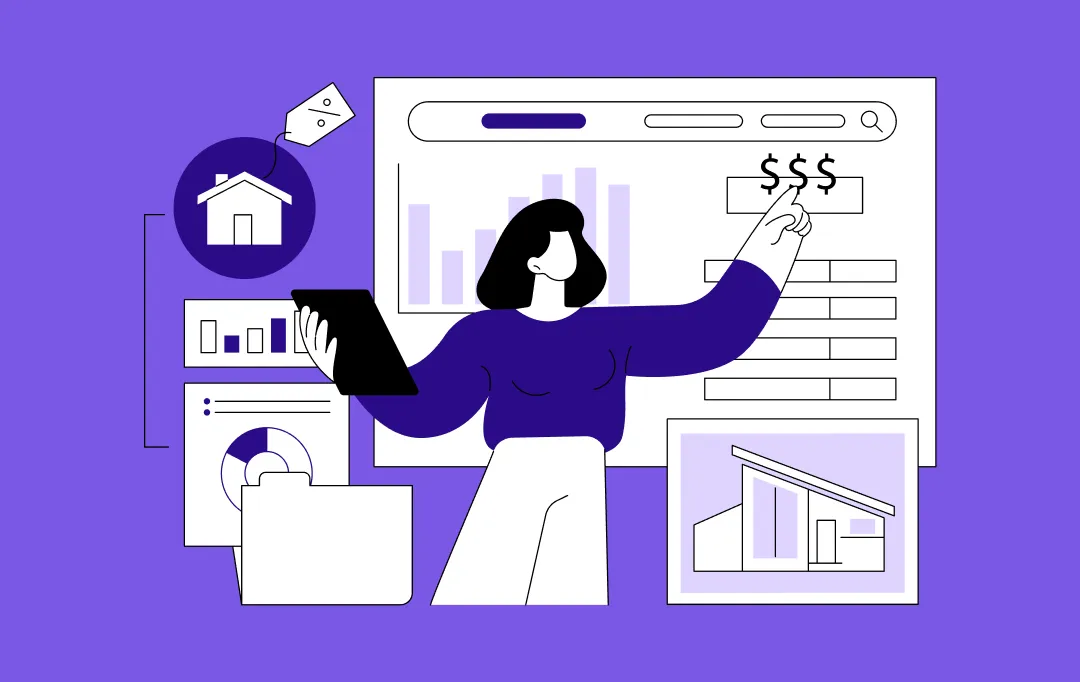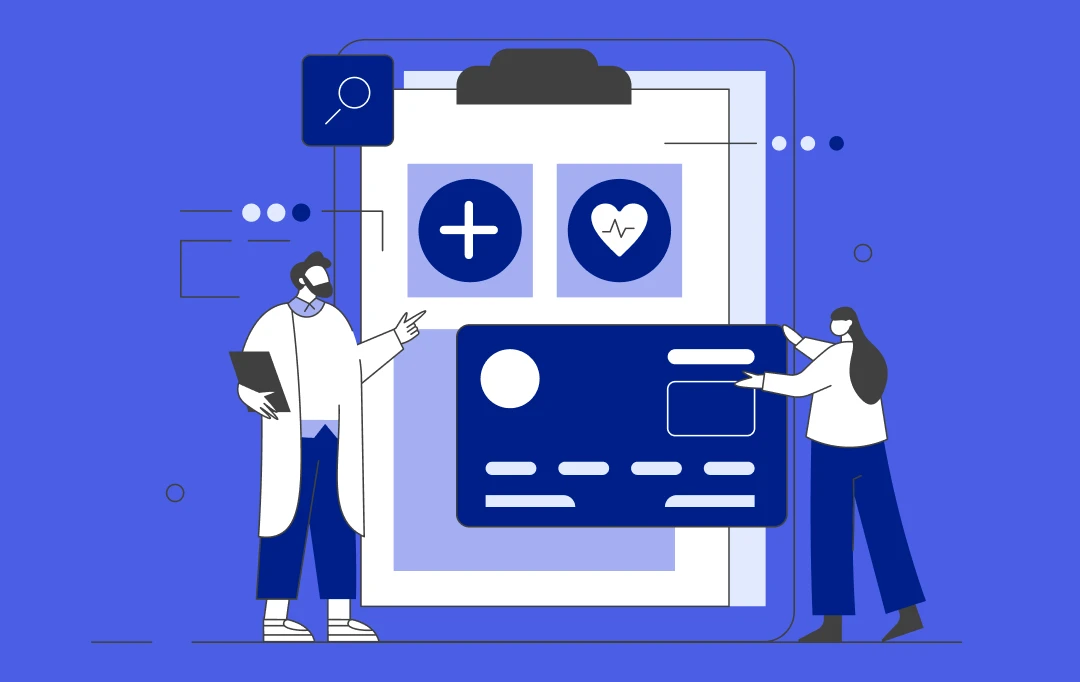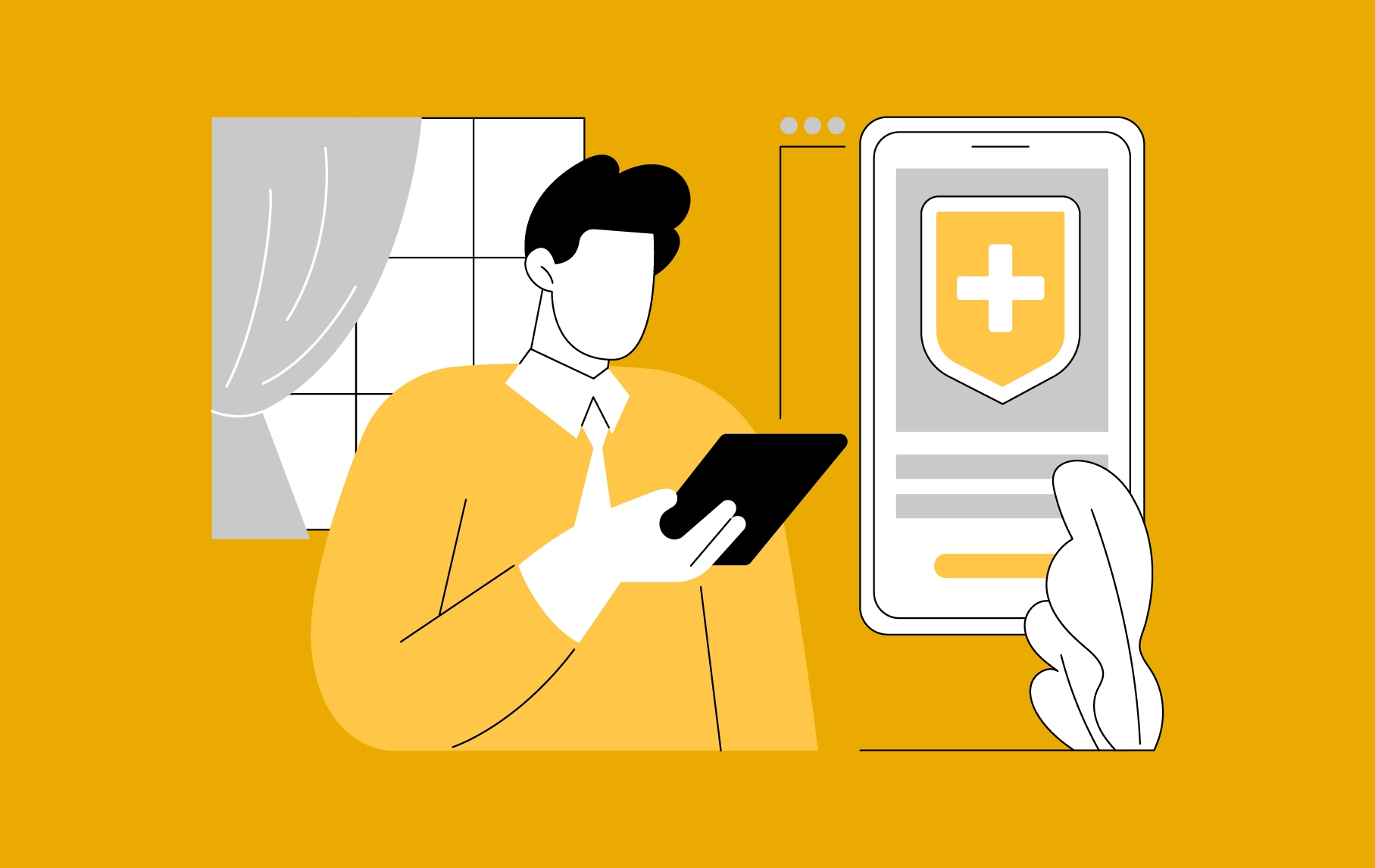- The Role of Business Intelligence in Healthcare
- Essential Business Intelligence Integration Types for Healthcare
- Electronic Health Records (EHRs)
- Claims and Billing Systems
- Regulatory and Compliance Data
- Patient Management Systems
- Human Resources and Staffing Data
- Healthcare eCommerce
- Healthcare CRM
- Pharmacy Management Software
- Laboratory Management Software
- How Business Intelligence is Transforming Healthcare?
- Operational Efficiency
- Cost Reduction
- Risk Management
- Improved Patient Experience
- Precision Medicine & Tailored Treatments
- Streamlined Compliance & Automated Reporting
- Smarter, Data-Driven Decisions
- Use Cases of Business Intelligence in Patient Care
- 1. Clinician-Driven Data Analysis for Enhanced Care
- 2. Financial Performance Optimization for Care Services
- 3. Improved Patient Care Coordination Among Departments
- 4. Streamlining the Development of Pharmaceuticals
- 5. Integrating Data Analytics into Treatment Protocols
- 6. Improved Interoperability and Data Exchange
- 7. Anticipating Health Trends with AI and Machine Learning
- 8. Enhanced Chronic Disease Management with BI Tools
- 9. Optimizing Supply Chain Efficiency in Healthcare Settings
- 10. Enhancing the Precision of Diagnostic Imaging with AI
- 11. Accelerating Emergency Response with Analytic Predictions
- Real-Life Applications of Business Intelligence in Healthcare Industry
- Mayo Clinic: Enhancing Patient Care with Predictive Analytics
- Cigna: Leveraging BI for Smarter Health Outreach
- Cleveland Clinic: Optimizing Healthcare Operations with BI
- Healthcare BI Tools: Implementation Cost and Timeline
- BI Implementation Cost
- BI Implementation Timeline
- Challenges and Considerations for Implementing Business Intelligence in Healthcare
- 1. Safeguarding Patient Data
- 2. Navigating Complex Healthcare Regulations
- 3. Integrating Technology with Legacy Systems
- 4. Ensuring the Accuracy and Governance of Data
- What Does the Future of BI in Healthcare Look Like?
- Let Appinventiv Be Your Partner in Developing Effective Healthcare BI Solutions
- FAQs
- Q. What is healthcare business intelligence?
- Q. Why do healthcare organizations need business intelligence tools?
- Q. What are some common examples of business intelligence in healthcare, and how do they impact patient outcomes?
- Q. What is healthcare business informatics?
- Q. How can hospital business intelligence software be effectively implemented to ensure both privacy and efficiency?
Healthcare generates a staggering 30% of the world’s data, yet 97% of it goes unused (Source: Forbes). In an era where data holds the key to better patient outcomes, BI or business intelligence in the healthcare industry is transforming decision-making.
From predictive analytics that prevent hospital readmissions to real-time dashboards that enhance clinical workflows, BI empowers providers to deliver faster, more precise care. Recent advancements in AI-powered diagnostics, automated reporting, and patient risk stratification are streamlining operations, reducing costs, and improving patient experiences.
Business intelligence for healthcare addresses these challenges head-on, providing hospitals and healthcare providers with advanced analytics, automated reporting, and AI-powered insights to drive efficiency and improve patient care.
As data complexity grows, BI is proving to be the catalyst that transforms fragmented information into life-saving decisions. In this blog, we will analyze the role of business intelligence software in healthcare, key integrations, real-world applications, implementation costs, challenges, and future trends. Let’s dive in.
The Role of Business Intelligence in Healthcare
Using business intelligence software in healthcare transforms the industry by turning vast and complex datasets into real-time, actionable insights. With the power of business intelligence software for healthcare, providers can enhance decision-making, improve patient care, and optimize operations with greater accuracy.
By seamlessly integrating data from electronic medical records, medical devices, and administrative systems, BI ensures a data-driven approach to every aspect of healthcare—from diagnostics to resource management, leading to improved efficiency and better health outcomes.
The impact of these advancements is increasingly evident, paving the way for future innovations and ensuring that medical decisions are consistently data-backed. This ever-growing landscape is reflected in the growth of the global healthcare business intelligence market. As per a report by Grand View Research, this is projected to reach $21.4 billion by 2030, growing at a CAGR of 13.5% from 2020 to 2030.
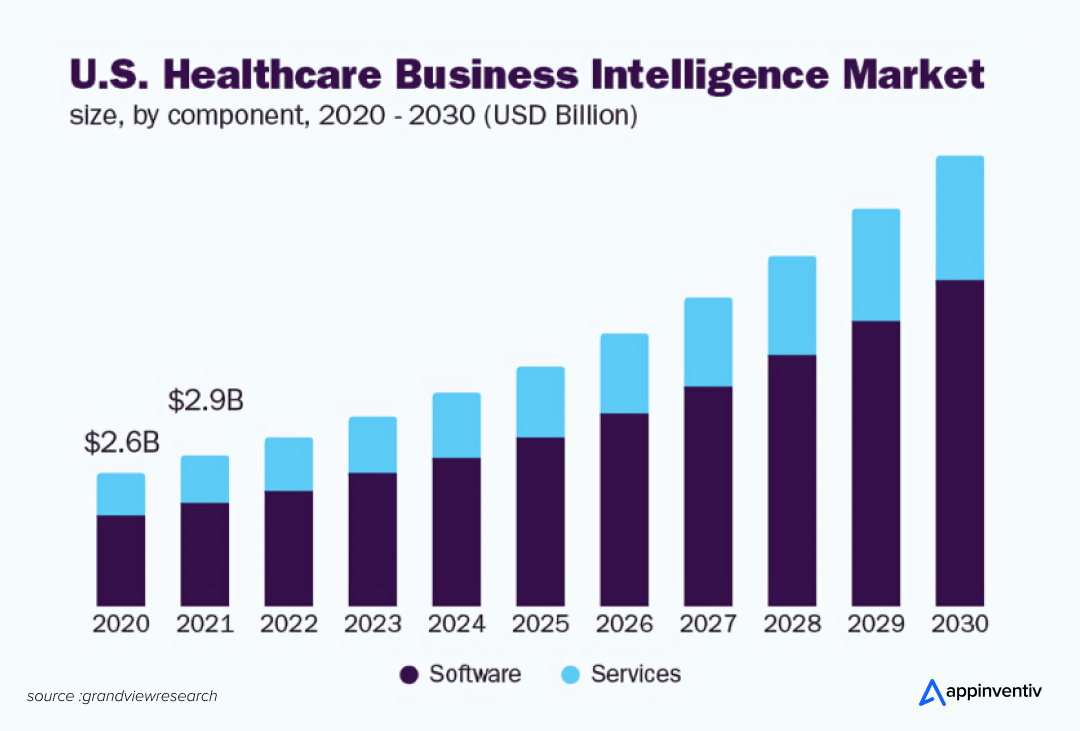
Some of the key components of healthcare business intelligence software include:
- Data Sources: BI pulls critical information from multiple sources, including EHRs, diagnostic tools, financial records, and hospital management systems, creating a foundation for informed decision-making.
- Data Integration: It seamlessly combines fragmented datasets from different platforms, ensuring a unified, cohesive data repository that eliminates silos and improves interoperability.
- Data Storage: Secure and scalable data warehouses or lakes store integrated information, enabling easy access to historical and real-time data for analysis and reporting.
- Data Analysis: Advanced analytics tools process vast amounts of structured and unstructured data, identifying trends, predicting outcomes, and offering actionable insights for improved clinical and operational strategies.
- Reporting & Visualization: Interactive dashboards and real-time reports transform raw data into visually compelling insights, empowering healthcare professionals to make faster, more precise decisions.
Also Read: What are the Best Data Visualization Practices For Businesses?
Essential Business Intelligence Integration Types for Healthcare
Healthcare business intelligence tools empower organizations to gather, store, secure, and analyze data effectively. It helps transform the raw data into valuable insights that can improve patient care, operational efficiency, and financial performance. So, before we dive into the revolutionary BI benefits and use cases, it is good to understand the various sources from which valuable healthcare business intelligence data is derived. In any healthcare facility, data flows in from numerous sources, including:
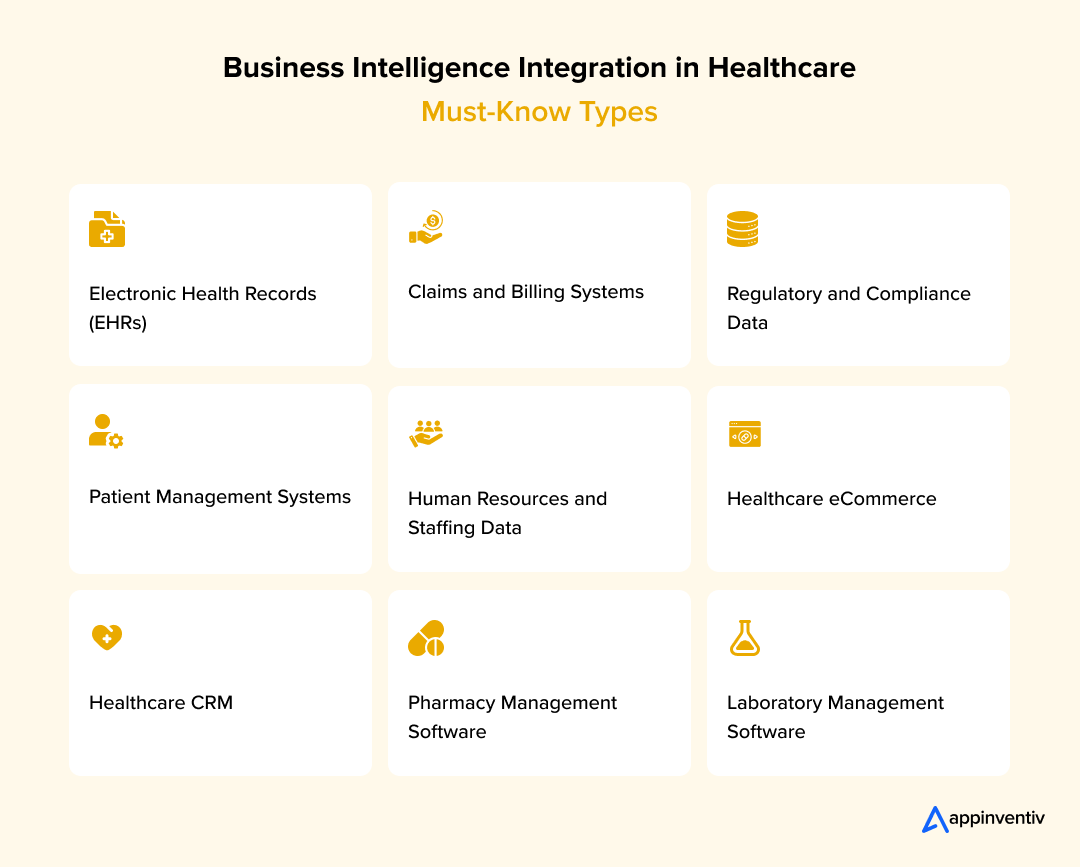
Electronic Health Records (EHRs)
EHR systems provide a comprehensive view of patient medical histories, Information from previous visits, lab results, and treatment plans. BI tools can analyze EHR data to identify trends in patient outcomes, optimize treatment protocols, and improve care quality.
Also Read: EHR Optimization Guide to Make Your Healthcare Offering Efficient
Claims and Billing Systems
Insurance claims and billing data provide insights into revenue and operational costs, allowing healthcare providers to streamline billing, track payments, and identify cost-saving opportunities. BI tools help monitor claim statuses and manage invoicing efficiently.
Regulatory and Compliance Data
Governments and regulatory bodies mandate that healthcare facilities track and report specific healthcare data to ensure compliance with standards such as HIPAA and GDPR. Business intelligence services in healthcare help organizations gather compliance data, protect patient privacy, and avoid costly penalties.
Patient Management Systems
BI in healthcare analyzes data from scheduling, admissions, and discharge systems to improve patient flow and resource allocation. It helps optimize staff allocation, reduce wait times, and streamline patient transitions between departments. This data efficiency helps improve both patient satisfaction and staff efficiency.
Human Resources and Staffing Data
Workforce data on staffing levels, shift schedules, and performance metrics helps healthcare organizations balance workload, improve staff productivity, and reduce burnout. It can directly impact patient care quality and enhance the administrative process.
Healthcare eCommerce
As digital healthcare solutions expand, healthcare eCommerce platforms are beneficial and facilitate online transactions for medical equipment, prescription refills, and telehealth services. By integrating BI tools, healthcare providers can analyze purchasing behaviors, enhance inventory management, and optimize supply chain logistics. Predictive analytics further assists in anticipating demand trends, enabling better resource planning and personalized patient recommendations.
Healthcare CRM
Healthcare Customer Relationship Management (CRM) systems track patient interactions, appointment histories, and engagement data. Integrating BI with healthcare CRM platforms enables providers to gain deeper insights into patient behavior, optimize communication strategies, and create personalized healthcare experiences. These insights improve patient retention and satisfaction and help healthcare organizations tailor their services for better care delivery.
Bonus Read: Guide to Healthcare CRM Software Development 2025
Pharmacy Management Software
Pharmacy management software development generates vast amounts of data related to medication dispensing, inventory tracking, and drug interactions. By integrating BI tools, healthcare providers can streamline stock management, minimize prescription errors, detect fraudulent activities, and enhance medication adherence. Advanced data visualization and real-time reporting enable pharmacies to monitor trends, identify inefficiencies, and make informed decisions on procurement and distribution.
Laboratory Management Software
Laboratory systems play a critical role in diagnostic testing and result management. By integrating BI, healthcare facilities can analyze lab performance, track sample processing times, and identify inefficiencies that impact patient care. Advanced BI solutions help laboratories enhance accuracy, optimize workflows, and generate insightful reports that aid faster and more informed clinical decision-making.
Now that we know the various types of healthcare BI tools and data sources let’s discover the different applications and advantages of business intelligence for healthcare.
How Business Intelligence is Transforming Healthcare?
By investing in these smart business intelligence systems, healthcare facilities can anticipate needs better and respond faster. Each incremental gain in efficiency potentially translates into lifesaving changes in patient care. Here are some of the pivotal Benefits of BI in healthcare.
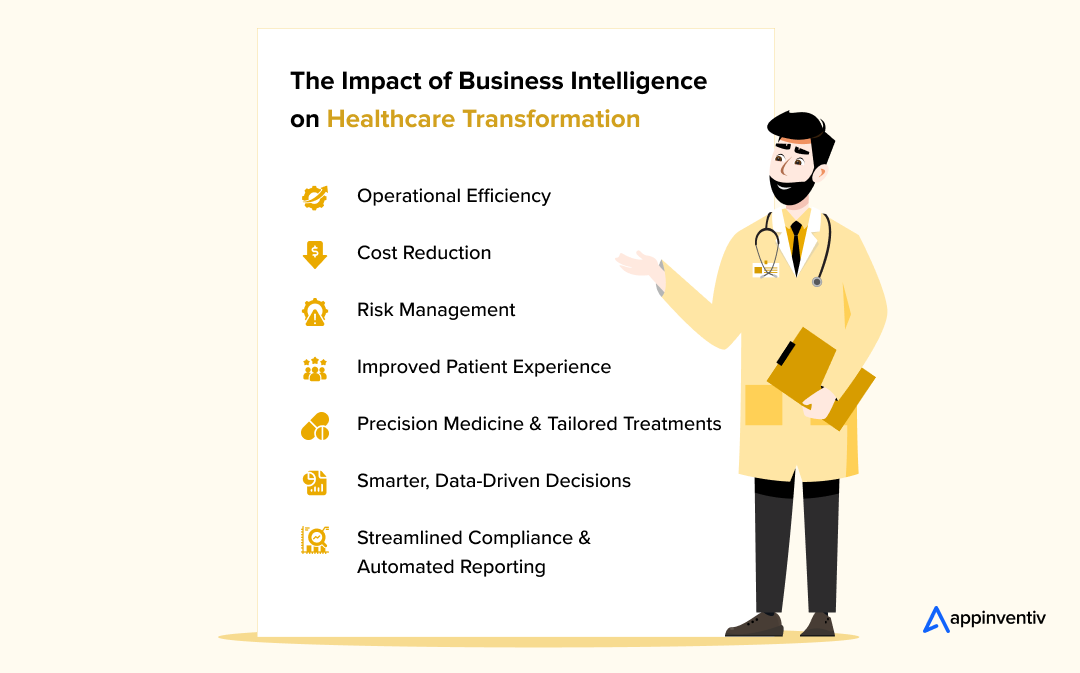
Operational Efficiency
Efficiency is vital for advancing patient care in the healthcare sector. By using medical business intelligence, hospitals refine processes for peak performance. This kind of intelligence converts complex datasets into actionable operational strategies. It helps in optimizing everything from patient admissions to discharge protocols.
Healthcare providers can thus minimize wait times and maximize care quality. Enhanced data analytics services facilitate precise inventory management, avoiding wastage. Efficient data utilization ensures the right resources are available at the right time. Such systematic improvements lead to a marked enhancement in overall patient services.
Also Read- Importance of Digital Transformation in Healthcare
Cost Reduction
In managing healthcare finances, accuracy and foresight are key. Applying Healthcare BI to improving patient outcomes often leads to significant financial savings. It identifies cost-saving opportunities without sacrificing the quality of patient care. Detailed analytics enable healthcare facilities to avoid unnecessary expenditures. By adopting business analytics in healthcare, hospitals can prevent financial leakages. This includes optimizing supply chain management and reducing administrative overheads. It also helps in standardizing care protocols to avoid expensive redundant procedures.
Through predictive healthcare business analytics, expensive emergency interventions can be reduced by foreseeing and addressing health issues early. Economical use of medical resources not only lowers costs but also boosts patient satisfaction. In the long term, such cost reductions can fund further innovations, thereby fostering a sustainable healthcare system. Every dollar saved through intelligent analytics can be reinvested into patient care, amplifying the potential for recovery and better health outcomes.
Risk Management
Managing risk is paramount in delivering high-quality healthcare. Business intelligence in healthcare equips providers with critical foresight. It identifies patterns that could lead to patient risk. Effective risk management means anticipating and preventing medical errors. It also involves ensuring patient data security and privacy. Business analytics in healthcare turns data into a defensive tool.
This reduces complications and enhances patient safety measures. Facilities become adept at predicting and avoiding potential hazards. The use of predictive analytics can also lead to better staffing decisions. It ensures that patient care is both safe and effective. This strategic application of data is transforming how hospitals preempt risks. With these systems in place, healthcare providers can focus on proactive improvements. This saves lives and significantly reduces the potential for costly errors. Thus, it has proven to be one of the major benefits of business intelligence in healthcare.
Improved Patient Experience
Creating a positive healthcare experience is critical for patient satisfaction. Utilizing business intelligence for hospitals directly impacts this area. It provides insights into patient preferences and behaviors. By analyzing this information, healthcare services can be made more patient-centric. Tailoring services to individual needs leads to better patient engagement. It also streamlines the efficiency of care delivery. This proves to be a major benefit of using business intelligence systems in healthcare. Facilities can adjust processes to reduce wait times and improve communication. A focus on patient experience is also linked to better health outcomes.
Satisfied patients are more likely to follow medical advice and maintain treatments. By prioritizing the patient experience, hospitals see a boost in their reputation. In the age of healthcare consumerism, a good reputation is invaluable. Continuous improvement in patient care is now driven by advanced healthcare business analytics. These insights enable healthcare providers to create a nurturing environment for their patients.
The integration of healthcare business intelligence tools is key to achieving higher standards in patient outcomes. This approach not only enhances care quality but also streamlines healthcare operations.
Precision Medicine & Tailored Treatments
Patients have distinct medical needs, and BI is transforming personalized care by analyzing EHRs, genetic data, wearables, and treatment histories. AI-powered predictive analytics allow healthcare providers to craft custom treatment plans based on a patient’s medical background, lifestyle, and risk factors. This data-driven approach boosts treatment success rates, reduces adverse effects, and shifts healthcare from reactive to proactive, enhancing overall patient well-being.
For example, oncology centers now use BI-driven insights to develop personalized cancer therapies, ensuring higher treatment efficacy with fewer side effects. With real-time data tracking, healthcare providers can continuously refine treatment protocols, leading to better patient adherence and long-term health improvements.
Streamlined Compliance & Automated Reporting
Keeping up with ever-evolving healthcare regulations is a challenge, but BI simplifies compliance by automating reporting, documentation, and regulatory tracking for standards like HIPAA, GDPR, and HITECH. Advanced analytics identify discrepancies in records, reducing errors and minimizing legal risks. Automated compliance monitoring strengthens data security and fosters patient trust, ensuring healthcare organizations stay audit-ready and fully compliant.
Hospitals can flag potential security breaches and non-compliant activities by integrating BI with AI-driven anomaly detection before they become liabilities. Additionally, BI enables healthcare administrators to conduct real-time audits, ensuring continuous adherence to industry regulations without burdening medical staff.
Smarter, Data-Driven Decisions
In today’s healthcare environment, data is the cornerstone of better decision-making. BI provides real-time analytics, allowing healthcare leaders to make strategic, evidence-backed choices that enhance patient outcomes, resource allocation, and policy effectiveness. With BI-powered dashboards and predictive modeling, organizations can monitor key metrics, recognize patterns, and adjust operations accordingly.
This proactive strategy minimizes inefficiencies, improves diagnostic accuracy, and ensures continuous advancements in patient care. By leveraging healthcare machine learning and AI-driven analytics, hospitals can foresee patient deterioration risks and prevent complications before they escalate. The ability to swiftly analyze vast amounts of structured and unstructured data ensures more precise interventions and better population health management.
Use Cases of Business Intelligence in Patient Care
Here are the top BI use cases in the healthcare industry that showcase how business intelligence is transforming patient care. These applications demonstrate the power of data-driven insights in improving healthcare outcomes and operational efficiency.
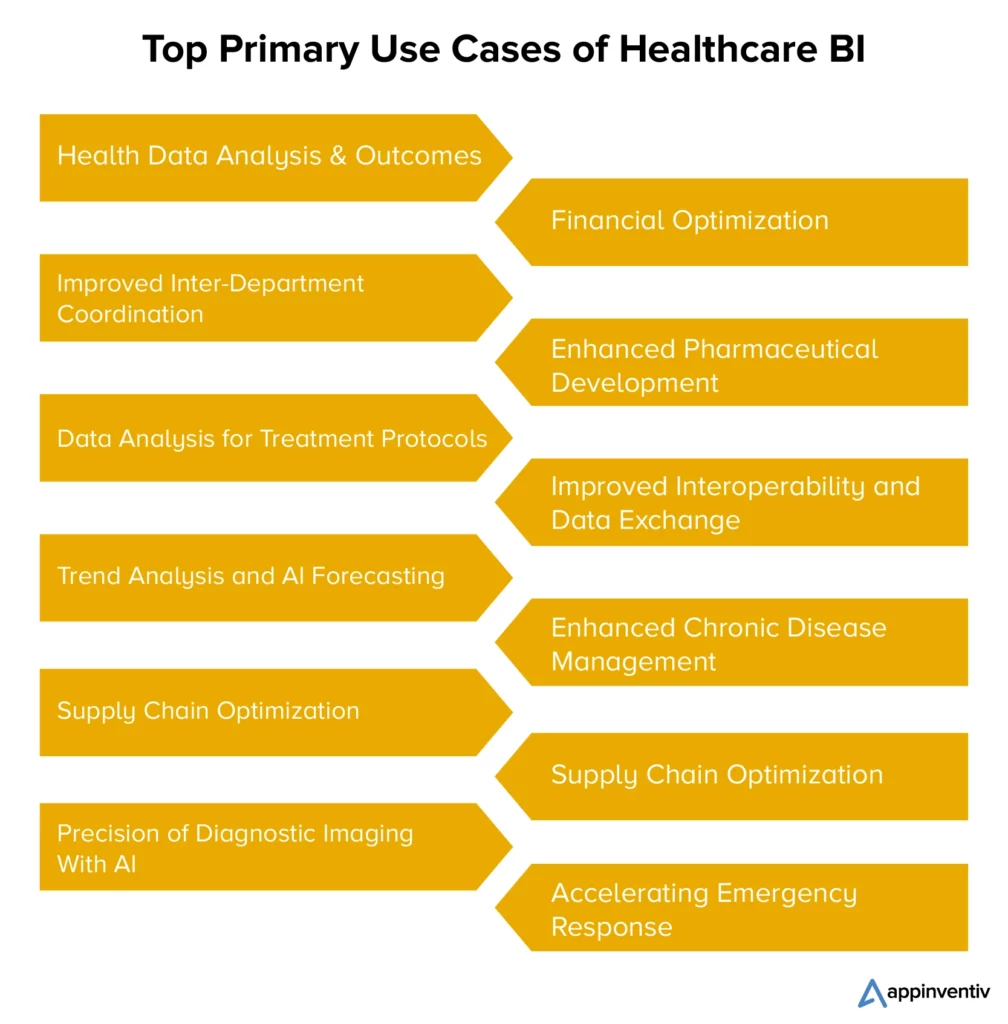
1. Clinician-Driven Data Analysis for Enhanced Care
Clinicians with access to business intelligence in healthcare make more informed decisions. They utilize patient data to personalize treatment plans. This leads to a precision approach to diagnosing and treating patients. By analyzing trends, they predict and prevent potential health issues.
Healthcare analytics and business intelligence also aid in tracking treatment outcomes. Real-time data helps adjust care plans swiftly and effectively. Clinicians have become more adept at managing chronic conditions with this data. It is not just about reacting but proactively improving patient health.
Examples of business intelligence in healthcare include predicting patient admissions and identifying high-risk patients. This proactive analysis contributes to a significant reduction in readmission rates.
2. Financial Performance Optimization for Care Services
Financial health is critical to sustaining quality patient care. Business analytics in healthcare identifies areas where costs can be reduced. It ensures that funds are utilized where they impact patient care most. Efficient financial management also leads to more affordable healthcare services.
With business intelligence for hospitals, financial waste is minimized. This optimization translates into better equipment and services for patients. Hospitals can thus invest more in cutting-edge technology and facilities. Financial data analysis also helps in setting fair pricing models. These models make services more accessible to a broader patient base. Overall, financial performance is enhanced, supporting superior patient care.
3. Improved Patient Care Coordination Among Departments
Coordinated care is essential for a seamless patient experience. Business intelligence for hospitals plays a pivotal role in improving this coordination. It provides a comprehensive view of patient interactions across departments. Shared analytics allow for synchronized patient treatment plans. This leads to fewer duplicated tests and more timely treatments. By breaking down silos, care becomes more cohesive and patient-focused.
Effective coordination reduces the likelihood of errors and improves health outcomes. It also significantly enhances the patient’s journey through the healthcare system. Technology ensures that every department works together towards common patient care goals.
4. Streamlining the Development of Pharmaceuticals
The integration of business intelligence in healthcare into pharmaceutical development streamlines research and production. This integration makes data analysis in clinical trials more efficient, facilitating quicker drug development cycles. It helps identify effective compounds earlier and accelerates the path to market.
Healthcare business intelligence solutions are pivotal in monitoring real-time data from drug trials. These solutions can predict patient populations that will respond best to new treatments. They also enable companies to adjust quickly to regulatory changes and market demands. This agility is essential in a field where time and accuracy are crucial.
5. Integrating Data Analytics into Treatment Protocols
Incorporating analytics into treatment protocols personalizes and enhances patient care. Business intelligence in healthcare allows for granular analysis of patient data, leading to highly individualized treatment plans. By understanding the use case of healthcare business intelligence, providers can predict which treatments will be most effective for specific patient demographics. Real-time analytics help in adjusting treatments as patient responses are observed.
This dynamic approach can significantly improve patient outcomes and satisfaction. Analytics can also lead to the development of new treatment protocols that may become the standard of care. By leveraging historical and real-time data, healthcare providers can continuously refine their practices to offer the best possible care to their patients.
6. Improved Interoperability and Data Exchange
Effective treatment often hinges on the seamless exchange of patient information. Healthcare business intelligence solutions are critical in achieving interoperability between disparate healthcare systems. They allow for secure and swift data exchange, which is essential for comprehensive patient care. Improved data sharing gives doctors a complete picture of patients’ medical histories.
This complete view is indispensable for accurate diagnoses and tailored treatment plans. By eliminating data silos, these solutions ensure that critical information is accessible when and where it’s needed. They empower healthcare providers to make informed decisions, enhancing the care received by patients.
7. Anticipating Health Trends with AI and Machine Learning
The use of AI in healthcare and machine learning is at the forefront of healthcare analytics and business intelligence. They not only anticipate health trends but also uncover new correlations. These technologies are adept at processing complex datasets to inform healthcare strategies. They identify trends that human analysis might overlook.
Machine learning algorithms can predict outbreaks and patient admission rates. This predictive capacity is a cornerstone for preventative care models. Use cases of healthcare business intelligence often illustrate its effectiveness in pandemic response and management. Healthcare providers can mobilize and respond quickly to patient needs by anticipating trends.
8. Enhanced Chronic Disease Management with BI Tools
BI solutions for healthcare shine in managing chronic diseases. They enable personalized care plans based on patient data analysis. These tools track patient health indicators and adjust treatments accordingly. Continuous monitoring of chronic disease patients through IoT wearable devices improves their quality of life. It also helps in preventing hospital readmissions by alerting providers to potential issues early. Patient adherence to treatment plans is better managed with data insights.
For instance, at Appinventiv, our experts developed a comprehensive healthcare platform called Health-e-People, which is designed for seamless record creation and management. This user-friendly, multi-dimensional solution caters to the needs of medical caregivers, patients, and researchers, positioning itself as the preferred choice in the healthcare industry.
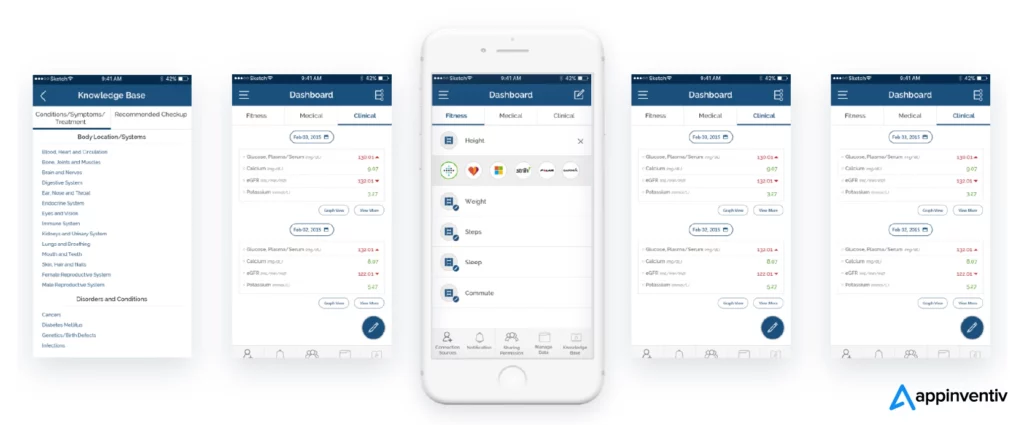
9. Optimizing Supply Chain Efficiency in Healthcare Settings
Efficient supply chains are crucial for uninterrupted healthcare services. BI in healthcare optimizes procurement and inventory control. It ensures essential medical supplies are in stock without over-ordering. Sophisticated Healthcare data analysis predicts supply needs with greater accuracy. It also minimizes the risk of expiring inventory through just-in-time ordering. Data-driven supply chain management leads to substantial cost savings.
These savings can then be redirected to improve patient care services. Regular analysis of supply usage patterns can refine ordering schedules. Predictive analytics helps in anticipating supply needs for epidemic outbreaks. Streamlined logistics support the fast delivery of critical supplies. Overall, effective supply chain management underpins the quality of patient care.
10. Enhancing the Precision of Diagnostic Imaging with AI
AI is revolutionizing the field of diagnostic imaging. Advanced algorithms assist in interpreting scans more quickly and accurately. They provide radiologists with enhanced decision-making tools. AI detects patterns that may be indicative of early disease. This leads to earlier interventions and better treatment outcomes.
Machine learning models continue to learn from new data. This ongoing learning process constantly improves diagnostic precision. AI also manages large volumes of imaging data, reducing patient wait times. Healthcare analytics and business intelligence are now integral to diagnostic imaging, facilitating better patient outcomes through technology.
11. Accelerating Emergency Response with Analytic Predictions
Quick and efficient emergency responses can be lifesaving. The use of healthcare BI for improving patient outcomes is pivotal in emergencies. Analytic tools forecast high-demand periods, helping hospitals to staff accordingly. Data models predict patient influx from seasonal illnesses or disasters.
This allows for preemptive action, ensuring readiness for sudden surges. Analytic predictions enable a swifter, more coordinated emergency response. With business analytics in healthcare, response teams can significantly reduce critical delays. Timely care during golden hours improves the chances of recovery. Business intelligence in healthcare, hence, is not only transformative but potentially lifesaving.
The effective use of healthcare business intelligence tools plays a crucial role in elevating the quality and efficiency of patient care. Let’s now have a look at the challenges of the same.
Real-Life Applications of Business Intelligence in Healthcare Industry
Healthcare BI software transforms medical delivery in numerous ways, as seen through various real-life applications. Many organizations have leveraged healthcare business intelligence software to enhance decision-making, improve patient care, and streamline operations. Let’s explore some of these impactful examples.
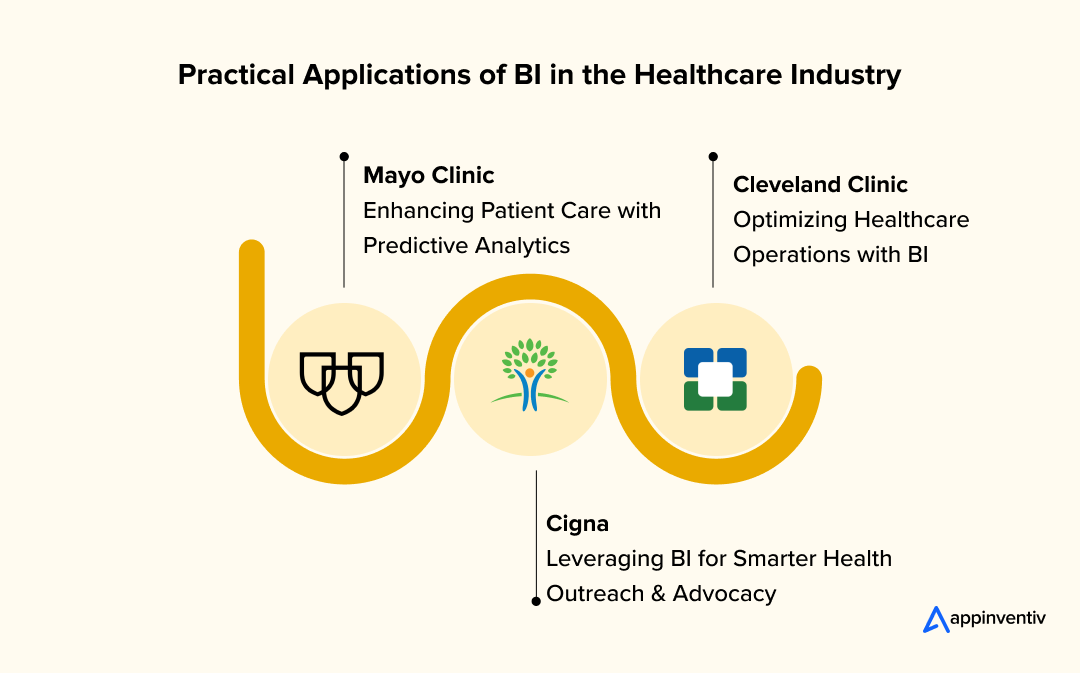
Mayo Clinic: Enhancing Patient Care with Predictive Analytics
Mayo Clinic leverages business intelligence (BI) tools for predictive analytics to minimize patient readmissions and enhance care quality. They can identify individuals at a higher risk of readmission by analyzing extensive patient data, including past admissions, treatments, and health patterns.
This allows healthcare providers to implement proactive, personalized follow-up care, reducing unnecessary hospital visits. For instance, patients flagged as high-risk receive additional monitoring, remote consultations, or tailored intervention plans to support their recovery. These data-driven strategies improve patient outcomes, optimize hospital resources, and reduce healthcare costs.
Cigna: Leveraging BI for Smarter Health Outreach
Cigna HealthCare has leveraged SAS business intelligence (BI) tools to enhance its health outreach and advocacy programs. Using SAS Enterprise BI Server, Cigna’s informatics team can efficiently analyze and communicate critical information, enabling timely, accurate reporting for customers, consultants, and brokers.
This capability supports initiatives like the Cigna Health Advisor program, which offers health and wellness coaching to members. Integrating SAS’s data management and analytics solutions has strengthened Cigna’s BI platform, facilitating improved member outreach and health outcomes.
Cleveland Clinic: Optimizing Healthcare Operations with BI
Cleveland Clinic utilizes business intelligence (BI) tools to enhance resource management and operational efficiency. The clinic optimizes schedules, reduces wait times, and improves patient care by analyzing patient flow, staffing levels, and equipment usage. Its advanced BI dashboards provide real-time insights into performance metrics such as mortality rates, physician scorecards, and patient experience.
Additionally, Cleveland Clinic integrates clinical input into digital tools, streamlining workflows and tightening operational oversight. These initiatives have improved hospital management, ensuring better resource allocation and enhanced healthcare delivery.
Healthcare BI Tools: Implementation Cost and Timeline
The cost and timeline of developing and deploying business intelligence in healthcare varies depending on several factors, such as the scale of the project, the complexity of data integration, and the specific BI tools or platforms used.
BI Implementation Cost
Healthcare BI implementation costs can range from $30,000 to $300,000 or more, depending on your project requirements. For instance, a basic straightforward project costs between $30,000 and $100,000, while a more complex project with advanced features can cost over $300,000.
BI Implementation Timeline
A typical BI implementation timeline can range from 3 to 6 months for smaller projects, while more complex implementations with extensive data integration and custom analytics can take 6 months to 1 year or longer.
[Also Read: How Much Does It Cost to Build a White-Label Healthcare Analytics Software]
Remember, this is just a rough estimate. The actual cost and timeline for BI implementation in healthcare can vary based on several critical components. To get a more accurate estimate for BI development cost and timeline, discuss your idea with us and get a detailed quotation tailored to your needs.
Challenges and Considerations for Implementing Business Intelligence in Healthcare
Mitigating the complex landscape of the healthcare business intelligence sector presents unique challenges and considerations. Here are the deeper insights on the challenges of BI in healthcare and solutions to overcome them:
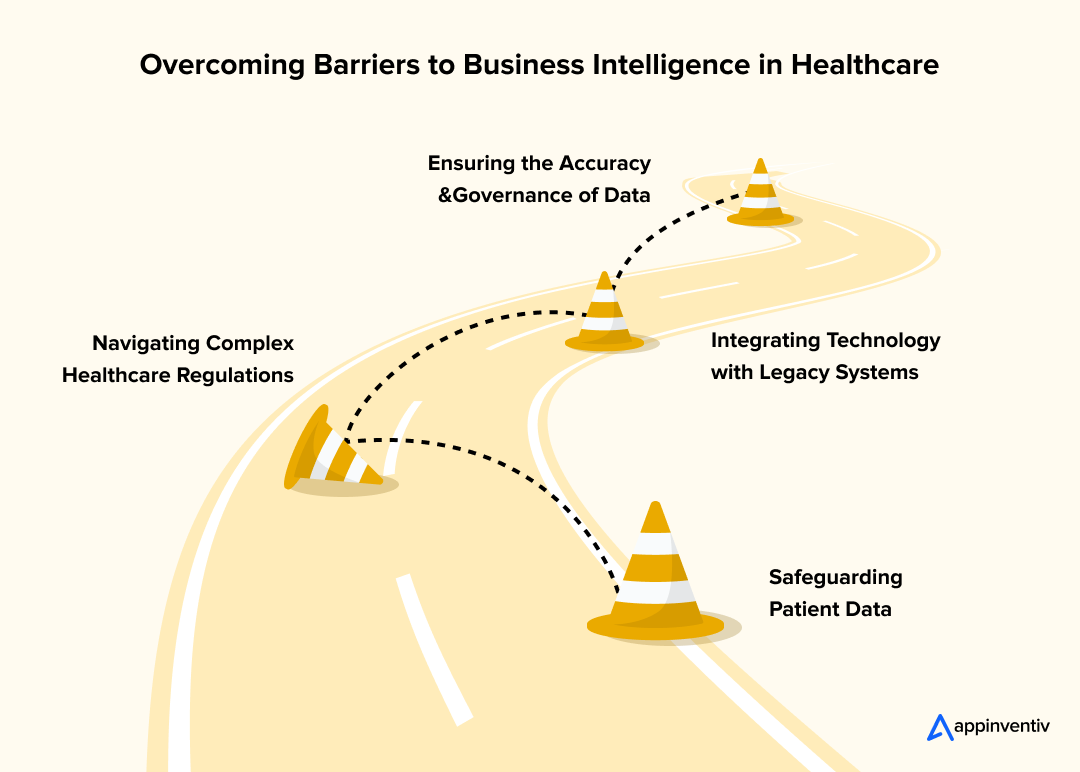 1. Safeguarding Patient Data
1. Safeguarding Patient Data
In the healthcare sector, data security must be the top priority. Protecting patient information requires advanced safeguards and constant monitoring. Cybersecurity threats evolve rapidly, necessitating up-to-date defense strategies. Every measure must ensure that patient confidentiality remains unbreached.
2. Navigating Complex Healthcare Regulations
Healthcare is one of the most heavily regulated industries. Each BI tool must be vetted for compliance with healthcare laws. This diligence ensures business intelligence for the healthcare industry supports care without legal risks.
3. Integrating Technology with Legacy Systems
Older healthcare systems can resist integration with modern BI solutions. Technical obstacles must be overcome to build a cohesive data ecosystem. Successful integration often requires significant time and financial resources.
4. Ensuring the Accuracy and Governance of Data
Data-driven healthcare demands high standards for data accuracy. False data leads to misinformed decisions and potentially harmful outcomes. Moreover, governing this data requires clear policies and vigilant enforcement. Within this environment, business intelligence in healthcare must operate flawlessly.
In addressing these considerations, healthcare organizations can bolster patient outcomes. The path forward is complex, but the advancements in care quality can be substantial. With careful implementation, BI can indeed reshape patient care for the better.
Overcoming these challenges is critical for leveraging the full potential of healthcare analytics in business intelligence to enhance patient outcomes.
Our managed IT services for healthcare have transformed numerous organizations and helped them provide exceptional patient care.
What Does the Future of BI in Healthcare Look Like?
The future of BI in healthcare is poised to be more intelligent, predictive, and patient-centric. AI-driven analytics will revolutionize clinical decision-making by enabling early disease detection, optimizing treatment strategies, and enhancing patient outcomes. Integrating real-time data processing and IoT devices in healthcare will improve remote patient monitoring, hospital resource management, and workflow efficiency, reducing operational costs and improving service delivery.
Additionally, interoperability and data security will be key focus areas as healthcare organizations navigate evolving regulatory standards. BI solutions will prioritize secure data sharing while ensuring strict compliance with privacy regulations. The growing adoption of self-service BI tools will empower healthcare professionals to independently analyze data, fostering a data-driven culture that enhances patient care and operational effectiveness.
Let Appinventiv Be Your Partner in Developing Effective Healthcare BI Solutions
At Appinventiv, we pride ourselves on delivering advanced business intelligence in healthcare. Our dedicated teams work closely with healthcare organizations to transform complex data into actionable insights, propelling patient care to new heights. We understand that each healthcare provider has unique challenges, and our analytics solutions are designed to meet these diverse needs with precision and care.
Our services are at the forefront of combating the evolving challenges in healthcare. It’s our commitment to ensure that business intelligence and analytics for healthcare organizations aren’t just about operational success but also about patient-centric outcomes.
As leaders in healthcare software development services, we help you navigate the transforming landscape with solutions that are as forward-thinking as they are effective. We aim to walk this path together towards a future where healthcare is driven by data, defined by excellence, and dedicated to patient well-being.
Connect with our experts to get started with your healthcare business intelligence software solution today.
FAQs
Q. What is healthcare business intelligence?
A. Healthcare business intelligence uses data analytics and reporting tools to turn raw data into actionable insights. This helps healthcare organizations make informed decisions by analyzing patient outcomes, operational efficiency, financial performance, and more.
With BI, healthcare providers can identify trends, reduce costs, improve patient care, and enhance efficiency. It leads to better health outcomes and more strategic management of resources.
Q. Why do healthcare organizations need business intelligence tools?
A. Business intelligence for the healthcare industry is no longer a luxury but a necessity. With vast amounts of patient, operational, and financial data generated daily, healthcare organizations need BI tools to transform raw information into actionable insights. Here are some of the reasons why business intelligence healthcare is crucial for ensuring efficiency:
- Smarter Decision-Making
- Optimized Operations
- Cost Efficiency & Financial Management
- Better Patient Care
- Compliance & Risk Mitigation
Q. What are some common examples of business intelligence in healthcare, and how do they impact patient outcomes?
A. Common examples of business intelligence in healthcare include using electronic health records to track patient histories and outcomes and predictive analytics to anticipate patient admission rates. These tools improve patient outcomes by enabling personalized care plans and efficient hospital resource use.
Q. What is healthcare business informatics?
A. Healthcare business informatics integrates data analytics, technology, and management to enhance healthcare operations and patient care. Leveraging business intelligence software for healthcare enables efficient decision-making, cost control, and workflow optimization. This approach transforms clinical, financial, and operational data into actionable insights, improving resource allocation and driving better health outcomes across the industry.
Q. How can hospital business intelligence software be effectively implemented to ensure both privacy and efficiency?
A. Hospital business intelligence software can be effectively implemented by adopting stringent data privacy measures such as encrypted data storage and secure data sharing protocols. This ensures that while operational efficiency is achieved through BI, patient privacy is never compromised.


- In just 2 mins you will get a response
- Your idea is 100% protected by our Non Disclosure Agreement.

How Business Intelligence in Manufacturing is Driving Data-Driven Decisions
As the manufacturing sector becomes increasingly intricate, leveraging data effectively has never been more critical. Manufacturers today navigate a labyrinth of processes, technologies, and human capital, all while striving for greater efficiency and innovation. This is where business intelligence for manufacturing emerges as a game-changer. By transforming complex datasets into actionable insights, BI enables organizations…

How data mining helps in business intelligence
Data is the life-powering proverbial blood that empowers the corporate economy of the 21st century. And although it may incite fanciful scenarios to mind with a mere mention, the truth is data is key to unlocking human productivity in every sphere of life. Climate change, business failures, epidemics, and crop production, all can be understood…
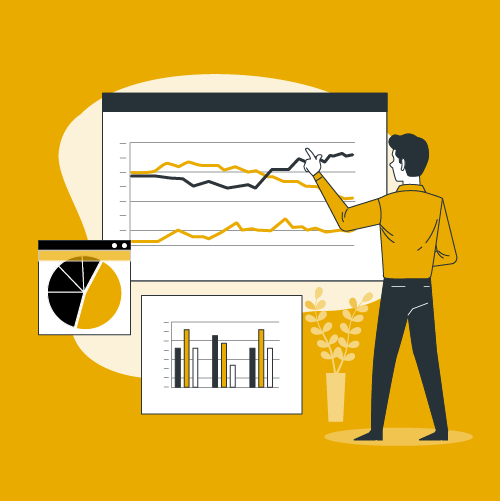
BI for financial services - How to build a successful BI strategy for your FinTech business?
Considering the volume of data financial service sectors disperse across applications, achieving a 360-degree view of customers and business as a whole can be challenging. This is where business intelligence for financial services comes into play. A robust BI solution for a financial services business helps convert a large amount of data into actionable insights.…





















